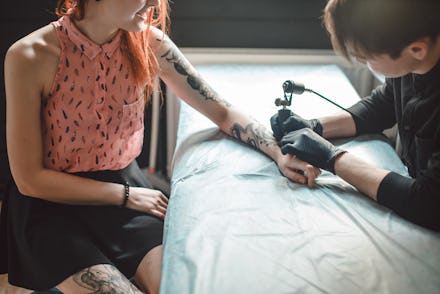The science behind your "addiction" to tattoos

When I first told people back in 2016 that I was getting my first tattoo, the most common response I got from those who were already inked themselves was, “You’re going to get addicted to getting tattoos.” I found this notion a little ridiculous — I was nervous enough just getting a small one on my ankle. I couldn’t imagine getting hooked on something that was not only expensive, but painful and permanent.
Fast forward to 2019, and I’ve since gotten two more tattoos, each one progressively larger and more detailed, and I’m already planning my fourth, fifth, sixth, etc. As I was warned, I have indeed gotten hooked. For me, it's both because I love how it makes me feel about my body, and because I've gotten to discover a new form of expression in my mid-30s.
According to a 2018 report from Statista, roughly 46 percent of Americans have at least one tattoo, and 30 percent of these people have two or three — 19 percent have up to four or five. Clearly, other people love getting inked just as much as I do. But while tattoos can be fun to have, are they actually addictive?
Not in the way you probably think. “The word addiction in the context of tattoos is misused,” says Dr. Daniel Selling, a psychologist at Williamsburg Therapy Group in New York. In order for a person's behavior to be deemed an addiction, it needs to meet a specific criteria: salience (the addiction becoming the most important thing in a person’s life), mood modification (the euphoric feelings that accompany the activity that they engage in), tolerance, withdrawal symptoms, conflict, and relapse, adds Dr. Mark Griffiths, a professor of behavioral addiction at the UK's Nottingham Trent University.
Tattooing, explains Dr. Griffiths, does not meet this criteria — and while any behavior can become impulsive, addiction also “relies on constant rewards or reinforcement." Alcoholics, gamblers, or drug users, for instance, might be able to feed their habits with frequent rewards, but even the most heavily tattooed people can't be constantly getting inked.
Based on the criteria and the infrequency of rewards, Dr. Griffiths concludes, "I would argue that it would be very hard to be addicted to getting tattoos."
Still, while you can’t have a tattoo addiction, per se, it can be a dependence where you feel some elements of need and withdrawal, according to Addiction Center, and perhaps spend too much time or money getting work done. If repeated tattooing is causing problems related to your finances, work, relationships, emotional well-being and/or physical health, San Francisco-based therapist Marc Wallis, suggests seeking professional help.
For many people who love tattoos, though, the passion doesn't interfere with their lives; rather, it enhances them. No one knows this better than renowned Los Angeles-based tattoo artist Lisa Orth, who has somewhere in the ballpark of 100 tattoos herself. “It’s an incredible feeling to be able to permanently customize yourself with artwork," she explains.
That feeling of self-expression, she adds, can be an empowering experience — and it's one of the main reasons she sees clients come back again and again. Tattooing can be a way of engaging with, and taking possession of, one’s body in an active way, Orth explains. She says it can allow people to define themselves visually in a way that forces the observer to see a person as they most authentically see themselves.
That’s a big draw (so to speak) for those who repeatedly get inked. In addition to the satisfaction a person can get from such a personal art form, Dr. Selling notes that being tattooed can also lead to an adrenaline rush of sorts. “It’s the body tolerating annoyance and pain coupled with excitement and change," he explains.
It's important to note, however, that that enjoying a rush is different than participating in self-harm. Since tattooing is a needle penetrating skin, that can potentially feed someone's desire to feel pain or change their appearance due to unhappiness with themselves. As explained by Dr. Tracy Alderman in Psychology Today, “Once in a while there will be cases in which piercing and/or tattoos do fit the definition of self-injury."
"But overwhelmingly," Dr. Alderman added, "self-injury is a distinct behavior, in definition, method and purpose, from tattooing and piercing.”
Besides the allure of the pain and pleasure of getting tattoos, some people enjoy doing it because it makes them feel like they're part of a larger culture. The images or words scrawled on their bodies might allow them to both fit into a group and stand out from others. Wallis notes that others, however, may view tattoos as a way to assert control over their bodies (particularly after cases of trauma or abuse, or in situations involving self-harm). A tattoo being used “to register a traumatic event is a powerful re-doing," wrote Dr. Suzanne Phillips in a PsychCentral post. "It starts at the body’s barrier of protection, the skin, and uses it as a canvas to bear witness, express, release and unlock the viscerally felt impact of trauma.”
But no matter what your reason(s) for getting multiple pieces done may be, the fact that it's always a unique experience is perhaps the biggest pull of all. Right now, I'm planning my next tattoo to be a blue whale on my thigh, a sentimental piece that will also make me feel mighty and fearless. After all, I've gone from being someone scared of getting my first tiny tattoo to someone who actively looks forward to making her body a whole new temple.
As Orth aptly puts it: “Getting tattooed is one of the remaining rituals in our culture that are physical, mental and emotional challenges, where you come out transformed on the other side.”